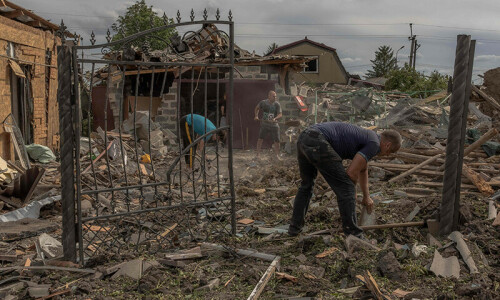TEHRAN: Iranians broadly deplore Western sanctions that have battered the economy, but the country’s six presidential candidates offer differing solutions — assuming the winner gets a say on foreign policy.
Punishing US sanctions, reimposed following Washington’s withdrawal from a landmark 2015 nuclear deal, have brought years of economic hardships, fuelling political malaise and wide popular discontent.
With the June 28 snap election fast approaching, debates between the candidates vying for Iran’s second-highest office have featured a key question: should Tehran mend ties with the West? Under the late president Ebrahim Raisi, who died last month in a helicopter crash, Western governments have expanded sanctions against Iran over its nuclear programme as well as its support for militant groups across the Middle East and for Russia in its war in Ukraine.
The sanctions have sharply reduced Iran’s oil revenues, heavily restricted trade and contributed to soaring inflation, high unemployment and a record low for the Iranian rial against the US dollar.
At Tehran’s bustling Grand Bazaar, shopkeeper Hamid Habibi, 54, said years of sanctions “have hit people very hard”. “Sanctions should be removed and ties mended with the US and European countries,” he said.
In two televised debates focused on the economy ahead of the presidential polls, “almost all the candidates explained that the sanctions have had devastating effects”, said Fayyaz Zahed, a professor of international relations at the University of Tehran.
“It is crucial to resolve this issue to alleviate the people’s suffering,” he said.
While the six contenders — five conservatives and a sole reformist — have all vowed to tackle the economic hardships, they offered varying views on Iran’s relations with the West.
‘Please the enemy’
“If we could lift the sanctions, Iranians could live comfortably,” said reformist candidate Massoud Pezeshkian, considered one of three frontrunners.
Pezeshkian, who is backed by key reformist groups in Iran, called for “constructive relations” with Washington and European capitals in order to “get Iran out of its isolation”.
On the campaign trail, he had the support of Mohammad Javad Zarif, a former foreign minister who helped secure the 2015 nuclear deal with world powers and insists it had positive impact on the Iranian economy.
Since the United States unilaterally withdrew from the accord in 2018, Iran has gradually reduced its commitment to its terms, meant to curb nuclear activity which Tehran has maintained was for peaceful purposes.
Diplomatic efforts to revive the deal have long stalled as tensions between Tehran and the International Atomic Energy Agency repeatedly flared.
Former president Hassan Rouhani, whose government negotiated the deal, said the sanctions cost Iranians “$100 billion a year, directly or indirectly, from the sale of oil and petrochemicals and the discounts they give” — in reference to preferential trade with China, a signatory to the 2015 agreement.
Published in Dawn, June 25th, 2024













































